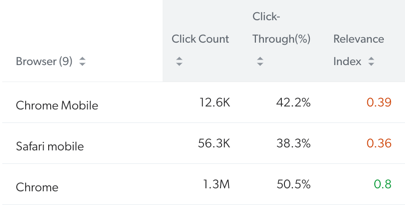Find Search Implementation Successes and Issues With Metrics
Find Search Implementation Successes and Issues With Metrics
Usage analytics cards such as table, metric, and trend cards display colored metric values:

-
A green value either means, depending on the metric, that the value has improved compared to a certain period (in trend cards) and/or that your Coveo-powered search interface has a good search relevance.
-
A black value can either be neutral or have no signification depending on the metric.
-
A red value either means, depending on the metric, that the value is retrogressing compared to a certain period (in trend cards) and/or that your Coveo-powered search interface has search relevance issues.
You can create analytics dashboards to learn for which metrics their search interface performs well and which metrics signal potential relevance issues (see Metrics).
Access a Dashboard in Edit Mode
-
On the Reports (platform-ca | platform-eu | platform-au) page:
-
Click the desired dashboard, and then click Open in the Action bar.
OR
-
Click Add, and then select Blank dashboard. You’re now in Edit mode.
-
-
(When opening an existing dashboard only) Click Edit in the upper-right corner.
Find Search Implementation Successes and Issues With Metrics
-
On the dashboard:
-
Add table, metric, or trend cards and report on at least the following relevance metrics, which are necessary to have an overview of search result relevance (see Add Metric Cards, Add Table Cards, and Add Trend Cards):
For trend and metric cards, you have to select a dimension on which the metric calculation is based on. We recommend that you select either Origin 1 (page/hub) or Origin 2 (tab/interface) at first to have the global overview of the search relevance of your interface/search page.
-
Review the metric value colors, and act if necessary.
The following table lists all available metrics, thresholds to determine value colors (if any), and for which metrics a higher value is better and vice versa:
Metric Threshold (if any)1 Higher values are always better2 Low values are always better Goodness of a value depends on the context3 Activity Attach to Case Count Click Event Count Search Event Clickthrough (%) - Green if > 60%
- Black between 40-60%
- Red if < 40%
Search Events With Clicks Relevance Index - Green if > 0.7
- Black between 0.5-0.7
- Red if < 0.5
Average Click Rank - Green between 1-3
- Black between 3-6
- Red if > 6
Custom Event Count Manual Search Event Count Search Event Count Refined Search Event Count Unique User ID Unique User IP Unique Visitor ID Visit Count 1: Values are colored regardless of the usage analytics card in which the metrics appear.
2: (If no thresholds) In comparison to a previous period, in trend cards only, higher values are green and lower values are red. In other cards (table, metric, …) the values of those metrics aren’t colored.
3: Since the goodness or badness of each metric value depends on the search implementation, and on the dimensions and filters applied, the values of those metrics are always displayed in black, regardless of the usage analytics cards in which they appear. For example, a high Custom Event Count value is bad when reporting on the number of cases created, but it’s good when reporting on the number of cases deflected.
-
Required privileges
The following table indicates the required privileges to view and edit dashboards from the Reports (platform-ca | platform-eu | platform-au) page and associated panels (see Manage privileges and Privilege reference).
Access to dashboards or part of their content may be further restricted as a function of the member (see Manage access to reports and Manage permission filters).
| Action | Service - Domain | Required access level |
|---|---|---|
| View report access configurations |
Analytics - Analytics data Analytics - Reports Organization - Organization |
View |
| Edit report access configurations |
Analytics - Analytics data Organization - Organization |
View |
| Analytics - Reports | Edit | |
| Analytics - Administrate | Allowed |